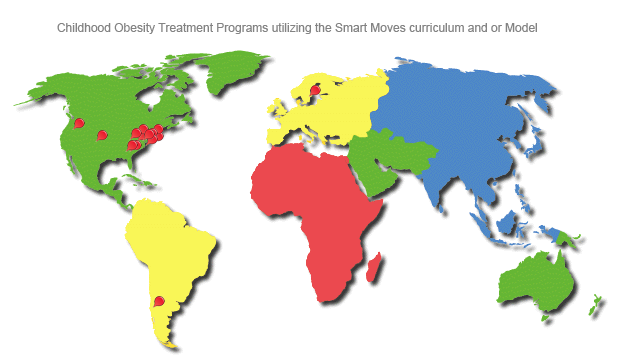Childhood obesity is a major public health concern.
Its prevalence in the U.S., and throughout the world, grows each year. Childhood obesity increases the risk of serious medical problems including type 2 diabetes, high blood pressure, asthma, cancer, heart disease, fatty liver, sleep apnea, osteoarthritis, polycystic ovary syndrome, and gallbladder disease.
Children and adolescents with elevated weight may also suffer from psychosocial problems such as poor self-esteem, depression, disordered eating, bullying and other social marginalization, including stigmatization.
The Smart Moves™ Program
Children and adolescents meet twice per week for exercise and once per week for a nutrition education or behavior modification class using the Smart Moves™ Workbook.
The program offers 12-week sessions that have approximately 6 nutrition topics and 6 behavior modification topics per session. Children are encouraged to attend consecutive sessions to obtain their weight management goals and further the educational process.
Nutrition Education
The program teaches better food choices and appropriate portion sizes for best long-term results. Dieting is not recommended since it encourages short-term changes and does not generally lead to permanent success. Registered Dietitians (RD) or master-level nutritionists teach all nutrition-related topics (40 minute class). Parents and caregivers are encouraged to join all nutrition-related classes since they do the grocery shopping and cooking and therefore need to be a role model for the family.
Parent/Caregiver Classes
Parents/caregivers will learn how to be role models to promote healthy behavior changes in the family environment. This component takes a solution-focused approach and encourages caregivers to be mindful of the whole child, and to increase the identification of the positive characteristics of the child. These classes provide support for parents/caregivers and allow for the opportunity to discuss challenges and celebrate successes with other parents/caregivers.
Behavioral Modification
Children will become more aware of overeating triggers and ultimately learn ways to cope with such triggers. The program carefully works on maintaining or developing a positive self-concept. RDs or mental health workers facilitate this portion of the program (40 minute class) and use the Smart Moves™ Workbook as a reference. Parents and caregivers are actually discouraged from attending these class topics since the children partake in more frank discussions without a parental figure present.
Physical Activity
In addition to improving eating behaviors, the program's goal is to increase children's physical activity level. Activity promotes weight loss and, later, helps maintain weight. Children are encouraged to exercise 30 to 40 minutes five times per week. The program offers two 50 minute, moderate cardiovascular workouts each week of the program. Trained exercise physiologists supervise the exercise component. The Bright Bodies Program offers an array of activity choices for overweight children such as, flag football, dancing, basketball, races, and active games.
There are many reasons for the development of childhood obesity, including:
-

Genetics
-

Poor food choices
-

Eating too much
-

Lack of physical activity
-

Too much screen time (TV, video games, etc)
-

Not enough sleep
-

Not having access to healthy food
-

Not having access to safe places to play outdoors
We can help
Whether you are a family looking for support or a professional looking for resources to help your patient, we can help.
We may be able to help a family find a comprehensive program in their area. We may also be able to help a professional develop their own program within their practice or organization.
The Smart Moves curriculum or program has been used in over 40 sites in the U.S. and other countries such as Chile, Dubai, and Canada. We want to help you, too.
Benefits of The Smart Moves™ Program Are Numerous
Benefits for Children
Lose Weight
Build muscle mass and lose fat mass
Increase energy
Make friends
Feel less isolated
Increase self-esteem
Learn healthier eating habits
Prevent or improve conditions such as: Type 2 diabetes, high blood pressure, sleep disturbances, and high cholesterol
Benefits for Parents/Caregivers
Improve family communication
Decrease stress of handling child's problem alone
Improve relationship with child with obesity
Improve family health




What the Research Shows Us
The program that uses Smart Moves at Yale is called Bright Bodies. It has been at Yale for over 20 years and we have had many years to study its effectiveness.
A program that is evidence-based means that it has been studied against a control group (a group not using the program) and it has had positive health benefits. This makes our program unique because many other programs do not have this.
Check out our studies (below):
-
Article: Journal of American Medical Association
We did a one year study comparing Bright Bodies with a clinic control group. At 1-year BMI decrease in the BB group was -1.7 units and there was an increase in the control group of +1.6 units (this is consistent with a typical increase in BMI each year for children with obesity). There were other positive outcomes in the BB group, including less insulin resistance (marker for diabetes), decreased % body fat, and decreased cholesterol.
Check out the study published in the Journal of the American Medical Association, 2007. We received recognition from the Cochrane Review for being the most effective program in a health-care setting.
-
Article: Pediatrics
We continued to follow these two groups from the above study for another year. The BB group no longer went to the program, but the clinic group continued to go to clinic. At the 2-year mark, the treatment effect between the two groups was sustained!
Check out this study published in Pediatrics, 2011. It was the first study showing positive 2-year results in a multi-ethnic population (African American, Latino, and Caucasian).
-
Article:
Later we wanted to use the program to treat a group of children with obesity who either had prediabetes or were on the cusp of developing prediabetes. This 6-month study was a project involving partners in the community. Children were randomized to either BB or their usual care at their clinic. There was greater conversion to normal glucose in the BB group (61%) than the control group (22%) and the BB group’s glucose decrease (-27.2 mg/dL) was statistically significant compared to the control group’s (-10.1 mg/dL). The insulin resistance markers were also improved in the BB group while they worsened in the control group.



